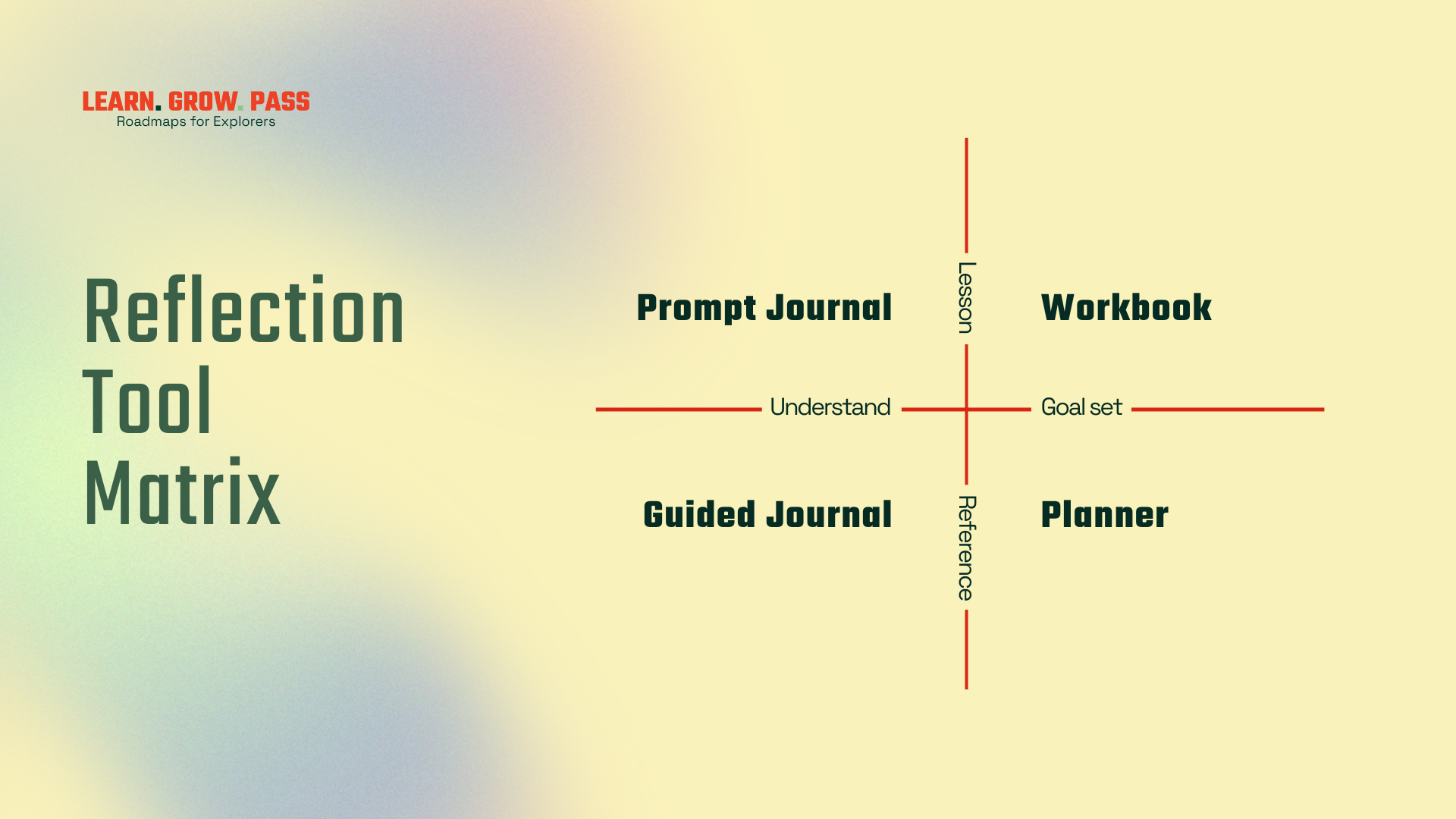38 tools to support reflection
The practice of reflection is an effective way to exercise memories and form new ideas that benefit the mind while reducing stress.

The practice of reflection is a form of personal knowledge management that includes goal setting, introspection, planning, and organization.
It’s an effective way to exercise memories and form new ideas that benefit the mind while reducing stress.
There are four key tools you can use to document your reflections either using digital or analog tools: prompt journals, workbooks, guided journals, and planners. Each of these tools can be categorized by their orientation which support self-discovery:
- Understand. Deeper dives into topics with a focus on discussion.
- Lesson. Exercises that support achievement of a goal.
- Goal set. Objectives and steps towards accomplishment.
- Reference. Information focused and can be referred back to.

Prompt journals
Good for those who don’t know what to write.
These prompt journals take the reader on a journey of understanding, while serving as an exercise tool. The reader can start anywhere in the journal and each prompt will provide a lesson.
- 1 second everyday by 1 Second Everyday (digital)
- Journal by Apple (digital)
- The journal of radical permission: A daily guide for following your soul's calling by adrienne maree brown and Sonya Renee Taylor
- Do work journal by Baron Fig
- The artist way morning pages journal: A companion volume to the Artist’s Way by Julia Cameron
- 642 things to write about by The San Francisco Writers’ Grotto
- Becoming by Michelle Obama
- Start where you are: A journal for self-exploration by Meera Lee Patel
- Affirming self: Journal prompts to remind you of your blessings and your power by Lisa-Marie Pierre
- I am the hero of my own life by Brianna Wiest
- The human being journal by Genevive Savundranayagam and Sheba Zaidi
Workbooks
Good for those who don’t know what to write and need to solve a problem.
Workbooks take the reader through lessons while achieving a goal. Workbooks like guided journals have focus areas. However, workbooks have a specific goal and exercises geared towards working through specific topics.
- The anti-planner: How to get sh*t done when you don’t feel like it by Dani Donovan
- The self-compassion workbook: Practical exercises to approach your thoughts, emotions, and actions with kindness by Joy Johnson, LCSW
Guided journals
Good for those seeking inspiration and willing to invest time in self reflection.
Guided journals take the reader on a journey of understanding while leaving the opportunity for continuous referencing of introspection. These guided journals have a focus area and have stories that serve as a guide, and use questions to provoke a deeper understanding.
- See, loved & heard: A guided journal for feeding the soul by Tabitha Brown
- The muse in you: Embrace creativity to overcome life’s difficulties by Lynn Newman
- Intellectual will: A self-discovery practice for intentional dreaming by Lisa-Marie Pierre, PhD.
- Craft a life you love: Infusing creativity, fun, & intention into your everyday by Amy Tangerine
- Jumpstart your growth: A 90-day improvement plan by John C. Maxwell
Planners
Good for those who need to keep track.
Planners take the reader on a journey of achieving a goal, while serving as a reference. Planners serve as an organization and time management tool for keeping track of dates, activities, and milestones.
- Vanguard planner by Baron Fig
- Astro planner by Chani
- The timeblock planner: A daily method for deep work in a distracted world by Cal Newport
- Passion planner by Passion Planner
Blank
Good for those who like to design their own path.
Blank notebooks are either in blank, dot grid, or lined format. Blank notebooks serve as a flexible way to design the reflection type needed.
- Notes by Apple (Digital)
- Arc notebook systems by Staples
- Baron Fig
- Bullet Journal by Ryder Carroll
- Keep by Google (Digital)
- Mead
- Notion (Digital)
- Remnote (Digital)
- Rhodia (Digital)
- Roam Research (Digital)
- Standard Notes (Digital)
Research
Good for those who like to see the theory and foundation behind practice.
Research exists that shares the intellectual and health benefits of writing and reflecting.
- The paper mirror: Understanding reflective journaling by Delaura Hubbs and Charles Brand
- A science-supported journaling protocol to improve mental & physical health by Huberman Lab
- Writing about emotional experiences as a therapeutic process by James Pennebaker
- Expressive writing can help your mental health by APA podcast with James Pennebaker
- Therapeutic journaling by U.S. Department of Veterans Affairs

